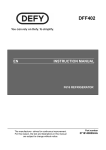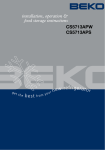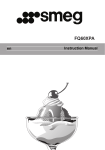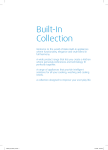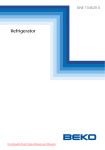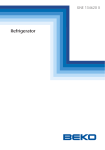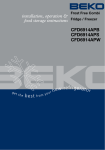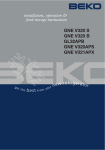Download Blomberg KWD 9440 X A+ Instruction manual
Transcript
Refrigerator Réfrigérateur Kühlschrank Frigorifero Køleskab Koelkast Koelkast Холодильник Jääkaappi Ψυγείο σας یخچال Ledusskapis Frigorifero Kjøleskap Frigorífico Хладилник KWD 9330 X A+ KWD 9440 X A+ IWD 1004 ET IWD 1005 XT IWD 1004 XT KWD 9440 X Instruction manual KWD 9440 XA++ Please read this manual first! Dear Customer, We hope that your product, which has been produced in modern plants and checked under the most meticulous quality control procedures, will provide you an effective service. For this, we recommend you to carefully read the entire manual of your product before using it and keep it at hand for future references. This manual • Will help you use your appliance in a fast and safe way. • Read the manual before installing and operating your product. • Follow the instructions, especially those for safety. • Keep the manual in an easily accessible place as you may need it later. • Besides, read also the other documents provided with your product. Please note that this manual may be valid for other models as well. Symbols and their descriptions This instruction manual contains the following symbols: C Important information or useful usage tips. A Warning against dangerous conditions for life and property. B Warning against electric voltage. CONTENTS Recycling This product is supplied with the selective sorting symbol for waste electrical and electronic equipment (WEEE). This means that this product must be handled pursuant to European Directive 2002/96/EC in order to be recycled or dismantled to minimise its impact on the environment. For further information, please contact your local or regional authorities. Electronic products not included in the selective sorting process are potentially dangerous for the environment and human health due to the presence of hazardous substances. 1 1 Your Refrigerator Your Refrigerator 3 4 2 Important Safety Warnings5 Intended use......................................... 5 General safety....................................... 5 Child safety........................................... 7 HCA Warning........................................ 7 Things to be done for energy saving...... 8 3 Installation 9 Points to be considered when retransporting your refrigerator................. 9 Before operating your refrigerator.......... 9 Electric connection............................. 10 Disposing of the packaging................. 10 Disposing of your old refrigerator......... 10 Placing and Installation........................ 10 Floor balance adjustment.................... 11 Adjusting the gap between the upper door................................................... 13 Installing Water Filter .......................... 14 Connection of the Water Pipe to the Refrigerator......................................... 15 Connection of Water Hose to the Jug .17 Connection of the Water Pipe to the Cold Water Mains Line ............................... 18 Prior to first use of Ice/Water Dispenser.19 4 Preparation 20 5 Using your refrigerator 21 Ice Off................................................. 24 Using the water spring........................ 25 Spillage Tray....................................... 25 Sliding Body Shelves.......................... 25 Blue light............................................ 26 Ion: . .................................................. 26 Egg tray.............................................. 26 Fresh Freeze Compartment................. 26 Crisper humidity control sliders........... 26 Recommendations for preservation of frozen food......................................... 27 Defrosting........................................... 27 Replacing the Interior Light Bulb.......... 27 6 Maintenance and cleaning29 Protection of plastic surfaces ............. 29 Chill compartment............................... 30 Icebox and Water Dispenser............... 31 Minibar............................................... 32 7 Recommended solutions for the problems 33 Setting the fridge compartment temperature........................................ 22 Setting the freezer compartment temperature........................................ 22 Fresh Freeze Function......................... 22 Quick Cool Function........................... 22 Vacation Button.................................. 23 Ionizer................................................. 23 Key Lock Button................................. 23 Water Dispenser Illumination............... 23 Water/Ice Type Selection..................... 23 Ice/Water Dispenser............................ 23 Using the Ice Dispenser........................ 24 2 EN 1 Your Refrigerator 1 2 3 24 4 6 * 5 23 7 22 21 25 8 *10 9 20 *12 11 *19 13 14 14 16 18 1. Freezer compartment 2. Fridge compartment 3. Fridge compartment interior light 4. Butter and cheese lid 5. Fan 6. Ioniser 7. Fridge compartment glass shelves 8. Egg tray 9. Fridge compartment door racks 10.Wine cellar 11.Bottle shelves 12. Bottle holder 13.Crisper compartments *17 *26 5 14.Crisper cover 15.Adjustable front legs 16.Blue light 17.Water reservoir 18.Ventilation lid 19.Freezer compartment drawers 20.Freezer Compartment glass shelves 21.Ice duct lid 22.Freezer compartment interior light 23.Fresh Freeze compartment 24.Ice container 25.Mini bar 26.Snack tray * OPTIONAL C Figures that take place in this instruction manual are schematic and may not correspond exactly with your product. If the subject parts are not included in the product you have purchased, then it is valid for other models. 3 EN 1 Your Refrigerator 1 2 3 24 *4 6 5 23 7 22 21 8 *10 9 20 *12 11 *19 13 14 14 17 18 1. Freezer compartment 2. Fridge compartment 3. Fridge compartment interior light 4. Butter and cheese lid 5. Fan 6. Ioniser 7. Fridge compartment glass shelves 8. Egg tray 9. Fridge compartment door racks 10.Wine cellar 11.Bottle shelves 12. Bottle holder 13.Crisper compartments *16 26 5 14.Crisper cover 15.Adjustable front legs 16.Blue light 17.Water reservoir 18.Ventilation lid 19.Freezer compartment drawers 20.Freezer Compartment glass shelves 21.Ice duct lid 22.Freezer compartment interior light 23.Fresh Freeze compartment 24.Ice container 25.Mini bar 26.Snack tray * OPTIONAL C Figures that take place in this instruction manual are schematic and may not correspond exactly with your product. If the subject parts are not included in the product you have purchased, then it is valid for other models. 4 EN 2 Important Safety Warnings Please review the following information. If these are not followed, personal injury or material damage may occur. Otherwise, all warranty and reliability commitments will become invalid. The usage life of the unit you purchased is 10 years. This is the period for keeping the spare parts required for the unit to operate as described. • • Intended use • This appliance is intended to be used in household and similar applications such as – staff kitchen areas in shops, offices and other working environments; – farm houses and by clients in hotels, motels and other residential type environments; – bed and breakfast type environments; – catering and similar non-retail applications. • It should not be used outdoors. It is not appropriate to use it outdoor even if the place is covered with a roof. General safety • When you want to dispose/scrap the product, we recommend you to consult the authorized service in order to learn the required information and authorized bodies. • Consult your authorized service for all your questions and problems related to the refrigerator. Do not intervene or let someone intervene to the refrigerator without notifying the authorized services. • Do not eat cone ice cream and ice cubes immediately after you take them out of the freezer compartment! (This may cause frostbite in your mouth.) • Do not put bottled and canned liquid 5 • • • • • • • • EN beverages in the freezer compartment. Otherwise, these may burst. Do not touch frozen food by hand; they may stick to your hand. Vapor and vaporized cleaning materials should never be used in cleaning and defrosting processes of your refrigerator. In such cases, the vapor might get in contact with the electrical parts and cause short circuit or electric shock. Never use the parts on your refrigerator such as the door as a means of support or step. Do not use electrical devices inside the refrigerator. Do not damage the cooling circuit, where the refrigerant is circulating, with drilling or cutting tools. The refrigerant that might blow out when the gas channels of the evaporator, pipe extensions or surface coatings are punctured may cause skin irritations and eye injuries. Do not cover or block the ventilation holes on your refrigerator with any material. Repairs of the electrical appliances must only be made by qualified persons. Repairs performed by incompetent persons may create a risk for the user. In case of any failure or during a maintenance or repair work, disconnect your refrigerator’s mains supply by either turning off the relevant fuse or unplugging your appliance. Do not pull by the cable when pulling off the plug. Place the beverage with higher proofs tightly closed and vertically. • Do not store explosive substances such as aerosol cans with a flammable propellant in this appliance. • Do not use mechanical devices or other means to accelerate the defrosting process, others than those recommended by the manufacturer. • This appliance is not intended for use by persons (including children) with reduced physical, sensory or mental capabilities, or lack of experience and knowledge, unless they have been given supervision or instruction concerning use of the appliance by a person responsible for their safety. • Do not operate a damaged refrigerator. Consult your service if you have any doubts. • Electrical safety of your refrigerator shall be guaranteed only if the earth system in your house complies with standards. • Exposing the product to rain, snow, sun and wind is dangerous with respect to electrical safety. • Contact the authorized service when there is a power cable damage and etc. so that it will not create a danger for you. • Never plug the refrigerator into the wall outlet during installation. Otherwise, risk of death or serious injury may arise. • This refrigerator is designed solely for storing food. It should not be used for any other purposes. • The label that describes the technical specification of the product is located on the inner left part of the refrigerator. • Do not hook up the refrigerator to electronic energy saving systems as it may damage the product. • If the refrigerator has blue light do not look at the blue light through optical devices. 6 • If the power supply is disconnected in manually controlled refrigerators please wait for at least 5 minutes before reconnecting the power. • This product manual should be passed to the next owner of the refrigerator if the owner changes. • When moving the refrigerator make sure that you do not damage the power cord. In order to prevent fire the power cord should not be twisted. Heavy objects should not be placed on the power cord. When the refrigerator is being plugged do not handle the power outlet with wet hands. • Do not plug the refrigerator if the electric outlet is loose. • Do not splash water directly on the outer or inner parts of the refrigerator due to safety. • Do not spray inflammable materials such as propane gas etc near refrigerator due to the risk of fire and explosion. • Do not place objects filled with water on top of the refrigerator as it may result in electric shock or fire. • Do not overload the refrigerator with excess food. The excess food may fall when the door is opened resulting in injuring you or damaging the refrigerator. Do not place objects on top of the refrigerator as the objects may fall when opening or closing the EN refrigerator door. • Materials that require certain temperature conditions such as vaccine, temperature sensitive medicines, scientific materials etc should not be kept in refrigerator. • If refrigerator will not be operated for an extended period of time it should be unplugged. A problem in electrical cable insulation may result in fire. • The tip of the electric plug should be cleaned regularly otherwise it may cause fire. • The refrigerator may move when the adjustable feet is not positioned firmly on the floor. Using the adjustable feet you can unsure that the refrigerator is positioned firmly on the floor. • If the refrigerator has door handle do not pull the refrigerator via door handles when moving the product as it may disconnect the handle from the refrigerator. • If you must operate your appliance adjacent to another refrigerator or freezer, the distance between the appliances must be at least 8 cm. Otherwise condensation may occur on the side walls facing each other. • Water mains pressure must not be below 1 bar. Water mains pressure must not be above 8 bars. • Use only drinkable potable water. HCA Warning If your product is equipped with a cooling system that contains R600a: This gas is flammable. Therefore, pay attention to not damaging the cooling system and piping during usage and transportation. In the event of damage, keep your product away from potential fire sources that can cause the product catch a fire and ventilate the room in which the unit is placed. Ignore the warning if your product is equipped with a cooling system that contains R134a. You can see the gas used in production of your product on the rating plate that is located on the left inner part of it. Never dispose the product in fire. Child safety • If the door has a lock, the key should be kept away from reach of children. • Children should be supervised to ensure that they do not play with the appliance 7 EN Things to be done for energy saving • Do not leave the doors of your refrigerator open for a long time. • Do not put hot food or drinks in your refrigerator. • Do not overload your refrigerator so that the air circulation inside of it is not prevented. • Do not install your refrigerator under direct sunlight or near heat emitting appliances such as ovens, dishwashers or radiators. • Pay attention to keep your food in closed containers. • Maximum amount of food can be put in your refrigerator’s freezer compartment when the freezer compartment shelf or drawer is removed.Declared energy consumption value of your refrigerator was determined when the freezer compartment shelf or drawer was removed and under maximum amount of food load.There is no risk in using a shelf or drawer according to the shapes and sizes of the foods to be frozen. 8 EN 3 Installation C Please remember that the manufacturer shall not be held liable if the information given in the instruction manual is not observed. Points to be considered when re-transporting your refrigerator 1. Your refrigerator must be emptied and cleaned prior to any transportation. 2. Shelves, accessories, crisper and etc. in your refrigerator must be fastened securely by adhesive tape against any jolt before repackaging. 3. Packaging must be tied with thick tapes and strong ropes and the rules of transportation printed on the package must be followed. C Always remember... Every recycled material is an indispensable source for the nature and for our national resources. If you wish to contribute to recycling the packaging materials, you can get further information from the environmental bodies or local authorities. 3. Insert the 2 plastic wedges onto the rear ventilation as illustrated in the following figure. Unscrew the existing ones and use the screws given in the same bag of wedges. Plastic wedges will provide the required distance between your refrigerator and the wall in order to allow the air circulation. Before operating your refrigerator Before starting to use your refrigerator check the following: 1. Is the interior of the refrigerator dry and can the air circulate freely in the rear of it? 2. Clean the interior of the refrigerator as recommended in the “Maintenance and cleaning” section. 9 EN 4. Plug the refrigerator into the wall outlet. When the door is open the respective interior light will come on. 5. You will hear a noise as the compressor starts up. The liquid and gases sealed within the refrigeration system may also give rise to noise, even if the compressor is not running and this is quite normal. 6. Front edges of the refrigerator may feel warm. This is normal. These areas are designed to be warm to avoid condensation. Electric connection Connect your refrigerator to a grounded socket which is being protected by a fuse with the appropriate capacity. Important: BThe connection must be in compliance with national regulations. BThe power cable plug must be easily accessible after installation. BThe specified voltage must be equal to your mains voltage. BExtension cables and multiway plugs must not be used for connection. BA damaged power cable must be replaced by a qualified electrician. BThe appliance must not be operated before it is repaired! There is danger of electric shock! Disposing of the packaging AThe packing materials may be dangerous for children. Keep the 10 packing materials out of the reach of children or dispose them of by classifying them in accordance with the waste instructions. Do not dispose them of along with the normal household waste. The packing of your refrigerator is produced from recyclable materials. Disposing of your old refrigerator Dispose of your old machine without giving any harm to the environment. AYou may consult your authorized dealer or waste collection center of your municipality about the disposal of your refrigerator. ABefore disposing of your refrigerator, cut out the electric plug and, if there are any locks on the door, make them inoperable in order to protect children against any danger. Placing and Installation B Caution: Never plug the refrigerator into the wall outlet during installation. Otherwise, risk of death or serious injury may arise. A If the entrance door of the room where the refrigerator will be installed is not wide enough for the refrigerator to pass through, than call the authorised service to have them remove the doors of your refrigerator and pass it sideways through the door. 1. Install your refrigerator to a place that allows ease of use. 2. Keep your refrigerator away from heat sources, humid places and direct sunlight. 3. There must be appropriate air ventilation around your refrigerator in order to achieve an efficient operation. If the refrigerator is to be placed in a recess in the wall, there must be at least 5 cm distance with the ceiling and at EN least 5 cm with the wall. If the floor is covered with a carpet, your product must be elevated 2.5 cm from the floor. 4. Place your refrigerator on an even floor surface to prevent jolts. 5. Do not keep your refrigerator in ambient temperatures under 10°C. Ensure that door shelves are empty when adjusting the door height. 1. Remove the lower ventilation cover by 2 Floor balance adjustment If your refrigerator is unbalanced; You can balance your refrigerator by turning the front legs of it as illustrated in the figure. (See Figure A) The corner where the leg exists is lowered when (C) (A) you turn in the direction of black arrow and raised when you turn in the opposite direction. Taking help from someone to slightly lift the refrigerator will facilitate this process. Door height adjustment In case there is a problem with the alignment of the doors with respect to each other, they may be re-aligned vertically in the order given below. 2 4 1 2 3 (B) 11 EN unscrewing its screws as shown in the figure below. (See Figure B) 2. Loosen the three screws of the hinges of the lower door, which you wish to escalate, with the help of a screwdriver as shown in the figure below. (Do not remove completely) (See Figure C) • If the freezer compartment door is lower than the fridge compartment door, bring them to the same level by turning the turning the elevation screw on the freezer compartment side in the direction of arrow using a M6 Allen wrench as illustrated in Figure D. • If the freezer compartment door is higher than the fridge compartment door, bring them to the same level by turning the elevation screw on the freezer compartment side in the reverse direction of arrow using a M6 Allen wrench as illustrated in Figure D. After bringing the doors to the same level by elevating the front part with the aid of the elevation screws,ensure the doors of the refrigerator shall close properly. If the doors do not close properly, this might adversely affect the efficiency of the refrigerator. Adjusting the gap between (D) 12 EN the upper door C You can adjust the gap between the situation should be made to take care. C Using a screwdriver, remove the fridge compartment doors as illustrated in the figures. Door shelves should be empty when adjusting the door height. Because of being wires in the hinge screw of upper hinge cover of the door you want to adjust. C Adjust the door appropriately as you desire by loosing the screws. cover of the freezer door, switch off the refrigerator power before removing hinge covers and this C Fix the door you have adjusted by tightening the screws without changing the position of the door. C Replace the hinge cover and fix with the screw. 13 EN Installing Water Filter (in some models) Installation Requirements Two different water sources may be connected to the refrigerator for water supply: the mains cold water supply and water in a jug. A pump should be used for jug water usage. 3. 5 meter long water pipe (1/4 inch in diameter) 4. Cold mains water valve with mesh filter (Tap Adapter) 5. Water Filter to be fitted to the bracket inside the fridge compartment. Water connection to the refrigerator Check that the parts stated below are supplied with your appliance. 1. Union for connection of the water pipe to the rear of the appliance 2. 3 pieces of pipe clips (In case required to secure the water pipe) 4 2 C Note: Since the following parts are not required in use with a jug, they may not be found in the product you purchased. 3 1 14 EN a a b 2 1 c Please follow the instructions below. Connection of the Water Pipe to the Refrigerator 15 1. After installing the union onto the water pipe, insert the water pipe to the refrigerator inlet valve by pressing downwards firmly. 2. Fix union as seen in the opposite figure, by squeezing by hand on the refrigerator inlet valve. (a- Water Pipe, b-Union, c-Valve) C Note 1: You should not need to tighten the union with a tool to achieve water tight assembly. In case of a leak use a spanner or a pair of pliers to tighten the union. To fit the water filter follow the instructions below referring to figures supplied: 1. Press ice cancel button on the display. (Figure 1) 2. Remove the filter cover in the fridge EN compartment by pulling it forward. (Figure 2) 3. Take out the water filter by-pass cover by rotating it downwards. (Figure 3-4) A Warning: Make sure that the “Ice off” mode is active before taking out the bypass cover. Note: It is normal that a few drops of water drip after the cover has been taken out. 4. Remove the lid on top of the water filter to place it as shown in the figure and turn upwards to lock it. (Figure 5) 5. Press ice cancel button on the display again to exit from this mode. Water filter should be replaced every 6 months. The water filter must be removed as shown in the figure when it is going to be replaced or when it will no longer be used and by-pass cover must be attached. It must be made sure that Ice Off mode is active before taking it out. A Warning: Water filter cleans some foreign particles in the water. It does not purify water from microorganisms. A Warning: Ice Off button must always be pressed during replacement of the 3 4 2 1 16 EN 5 water filter or installing the by-pass cover. C Note: You may refer to the user (in some models) Connection of the Water Pipe to the Cold Water Mains Line Connection of Water Hose to the Jug To connect water to the refrigerator from a jug, a pump is needed. Follow the instructions below after connecting one manual of the pump while making the water connection. (in some models) If you want to use your refrigerator by connecting it to the cold water mains line, 1a 1b end of the water pipe coming out of the pump to the refrigerator as described on the previous page. 1. Finish the connection by pushing the other end of the water pipe into the water pipe inlet of the pump as shown in the figure. 2. Put and fix the pump hose into the jug as shown in the figure. 3. After completing the connection, plug in and run the pump. To provide an efficient operation of the pump, wait for 2-3 minutes after starting the pump. 17 2 EN you will have to connect a standard 1/2” valve connection fitting to the cold water supply in your house. In case this valve is not present or in case you are not sure, consult a qualified plumber. Prior to first use of Ice/Water Dispenser 1. Separate the union from the tap adaptor. (Figure A) 2. Install the tap adaptor to 1/2” valve fitting as shown in the figure. (Figure B) 3. After inserting the water pipe to the union, install it to the tap adaptor and insert to the tap as shown in the figure. (Figure C) 4. Tighten the union manually. In case of a leak use a spanner or a pair of pliers to tighten the union. C Water mains pressure must not be C Water mains pressure must not be below 1 bar. over 8 bars. A Warning: Secure the water pipe to suitable points by means of the pipe clips supplied to avoid any damage or displacement or accidental disconnection. A Warning: After turning on the water valve, make sure that there is no leakage at both connection points of the water pipe. In case of a leak, turn off the valve immediately and tighten all joints again using a spanner or a pair of pliers. A Warning: Make sure that standard 1/2" valve fitting fed by cold mains water supply is available and is turned off fully. Note -1: There is no need to use water filter in case a jug is used. Note -2: Pump must be used when jug will be used. 18 EN C Pumps must be used in case the supply water pressure drops below 1 bar or if a jug is going to be used. C Always use the water filter when a jug is not being used. C Water system of the refrigerator must be connected to the cold water line. It must not be connected to hot water line. C No water may be obtained in the initial startup of the refrigerator. This is caused by the air in the system. To discharge air from the system, press Dispenser latch for periods of 1 minute until water comes from the Dispenser. Water flow may be irregular in the beginning. Irregular water flow will be normalized after the air in the system is discharged. C At the initial startup of the refrigerator approx.12 hours must pass before cold water can be obtained. C Water mains pressure must be between 1-8 bars for the operation of Ice/Water Dispenser smoothly. For this, check that 1 glass of water (100 cc) can be filled in 10 seconds. C The first 10 glasses of water should not be consumed. C 12 hours must pass to obtain ice from the Ice Dispenser for the first time. If there is not enough ice in the ice dispenser, ice may not be obtained from ice dispenser. C Approximately the first 30 cubes of ice to be obtained from the Ice Dispenser must not be used. 19 EN 4 Preparation C Your refrigerator should be installed at least 30 cm away from heat sources such as hobs, ovens, central heater and stoves and at least 5 cm away from electrical ovens and should not be located under direct sunlight. C The ambient temperature of the room where you install your refrigerator should at least be 10°C. Operating your refrigerator under cooler conditions than this is not recommended with regard to its efficiency. C Please make sure that the interior of your refrigerator is cleaned thoroughly. C If two refrigerators are to be installed side by side, there should be at least 2 cm distance between them. C When you operate your refrigerator for the first time, please observe the following instructions during the initial six hours. - The door should not be opened frequently. - It must be operated empty without any food in it. - Do not unplug your refrigerator. If a power failure occurs out of your control, please see the warnings in the “Recommended solutions for the problems” section. C Original packaging and foam materials should be kept for future transportation or moving. 20 EN 5 Using your refrigerator Fridge Set button Vacation mode button Freezer Set button Quick freeze button 3 Quick Cool button 3 3 Key lock button Auto Eco button Filter Reset button Ice / Water selection button Water Dispenser light button Ice Off button Water Dispenser Lights Ioniser indicator Economy mode indicator Fast Freeze indicator High humidity indicator Freezer Compartment Temperature Setting indicator Quick cool indicator Fridge temperature setting indicator High temperature/ error warning indicator -24 °C 2 °C -22 °C 4 °C -20 °C 6 °C -18 °C 8 °C Fridge door open indicator Freezer door open indicator Filter reset indicator Cube Ice Auto Eco indicator indicator Key Lock indicator Crushed Ice indicator Vacation mode indicator Water indicator No ice indicator 21 EN Freezer Compartment Adjustment -18°C Fridge Compartment Adjustment 4°C Explanations This is the normal recommended setting. These settings are recommended when -20,-22 or -24°C 4°C the ambient temperature exceeds 30°C. Use this when you wish to freeze your Fresh Freeze Display food or make ice in a short time. Your 4°C will show -27°C refrigerator will return to its previous mode when the process is over. If you think that your fridge compartment is not cold enough because of the hot -18°C or colder 2°C conditions or frequent opening and closing of the door. Quick Cool You can use it when your fridge -18°C or colder Display will show compartment is overloaded or if you wish +1°C to cool down your food rapidly. return to the highest setting. Release at the desired temperature and the new set Setting the fridge temperature will be stored. compartment temperature Fridge compartment temperature can be set at one of the following temperatures: 8,6,4 and 2°C Press the Fridge Set button to change. The temperature will decrease by 2°C. Every time you press the button, the temperature will go down and then return to the highest setting. Release at the desired temperature and the new set temperature will be stored. If you think that your food is colder than you desire, you can adjust the temperature setting of fridge compartment to 6 or 8. Fresh Freeze Function Freezer temperature can be set at one of the following temperatures : -18,-20,-22 and -24°C Press the Freezer Set button to change. The temperature will decrease by 2°C. Every time you press the button, the temperature will go down and then Quick Cool Function Setting the freezer compartment temperature 22 When you press “Fresh Freeze” button, the compressor will run for about 24 hours. Fresh Freeze indicator will glow and freezer compartment temperature settings will switch to –27°C whilst the Fresh Freeze is active. To cancel this function press Fresh Freeze button again. Fresh Freeze indicator will turn off and return to its normal settings. Fresh Freeze will cancel itself automatically after about 24 hours if you do not cancel it. If you want to freeze large amounts of fresh food, press the Fresh Freeze button 24 hours before putting the food into the freezer compartment. When you press Quick Cool button, the temperature of the compartment will be colder than the adjusted values. This function can be used for food placed in the fridge compartment and required to be cooled down rapidly. EN After pressing the Quick Cool button, Quick Cool indicator will glow and fridge compartment temperature setting will switch to 1°C whilst the Quick Wool is active. To cancel this function press Quick Cool button again. Quick Cool indicator will turn off and return to its normal settings. Quick Cool function will cancel itself automatically in case you do not cancel it. Vacation Button In case the fridge compartment will not be used for a long time, the usage of the fridge compartment may be cancelled by pressing on the Vacation Button. By this way, the refrigerator may operate more economically. Press on Vacation Button for 2 seconds to activate this function. When this function is active, the door of the fridge compartment must be kept closed and no food must be left in the fridge compartment. Auto Eco Button (Special Economy function) When “Auto Eco” button is pressed, Auto Economy Function will be activated. If the door of the fridge compartment is kept closed for a long time when this function is selected, the fridge compartment will switch to a more economic operation mode to safe electricity automatically. When the Auto Eco button is pressed again, this function is deactivated. Water Dispenser Illumination When the Light button is pressed, the water dispenser lamp will light up and it will go off when the button is pressed again. This illumination will also light up when the water dispenser latch is pressed, and it will go off delayed when the latch is released. Water/Ice Type Selection With Dispenser Selection button, either one of “water”, “ice cube” or “crushed ice” options is selected. Ice/Water Dispenser With its three different functions, the dispenser efficiently meets your cold water, cube ice and crushed ice needs without having to open the door of the refrigerator. It is a continuous cold water and ice source without adding water. User friendly control panel provides the following dispensing functions: Note: • Water or ice can be dispensed for a maximum of 60 seconds at each use. • When the freezer door is open, the dispenser will not work. Ice Cube Ionizer Ionizing in the refrigerator is carried out automatically. Key Lock Button The key lock is activated when this button is pressed for 3 seconds and all buttons and the dispenser latch will not work. If you want to deactivate key lock press again for 3 seconds. 23 EN Crushed Ice Cold Water Using the Ice Dispenser C Please note, first ice cubes will not be ready before 12 hours after switching on the appliance. In case you do not need ice, such as during winter or in case you are on vacation, select the ice off function. C Ice device produces approximately 110 cubes of ice in 24 hours and this amount may change according to the frequency of opening of doors, refrigerator settings and power outage. Produced ice may be obtained from the dispenser as cube ice or crushed ice. It is normal to get crushed ice from the dispenser in a longer time than in getting the ice cubes and also flowing of some crushed ice before the ice cubes drop if crushed ice option had been selected before selecting ice cube option. C If the ice dispenser hasn't been used for a long time or after a power cut the ice may form clumps or if the ice has taken on a change in smell or taste then the ice must be disposed of and the icebox cleaned thoroughly. Warnings C No ice must be added to the ice dispenser compartment. This may adversely affect the ice supply or crushing the ice. A It is normal to have a couple of ice cubes stuck together in the icebank. A Moving parts such as blades in a housing at the ice outlet of the dispenser must not be touched to avoid injury. A Never use sharp objects to break 24 the ice in the icebox. This may cause damage on the icebox. A Food stuff should never be placed into the icebox for quick cooling purposes. AWhen the icebox is to be removed for any reason, first of all Ice Off Button must be pressed. Ice Off C To stop ice formation, Ice Off button is pressed. When Ice Off is selected, no water will be taken into the Icematic. However, already existing ice can be taken from the dispenser. To restart ice formation, Ice Off button must be pressed again. Warning: If you do not use the ice dispenser, do not forget to put ice duct cover into the ring inside of the freezer door. (See. Your Refrigerator section) EN Using the water spring Sliding Body Shelves Sliding body shelves can be pulled by slightly lifting up from the front and moved back and forth. They come to a stop point when pulled towards front to allow you reach the foods placed at the back of the shelf; when it is pulled after slightly lifting upwards at the second stop point, the body shelf will be released. The shelf should be held tightly from the bottom as well in order to prevent it from tipping over. The body shelf is placed on the rails at the sides of the refrigerator body by bringing it to one lower or one upper level. The body shelf should be pushed backwards to seat it completely. Warnings It is normal for the first few glasses of water taken from the dispenser to be warm. In cases where the water dispenser has not been used frequently, sufficient amount of water must be drained from the dispenser to get fresh water. Spillage Tray Water drops that drip during use, accumulates in the spillage tray. You can remove spillage tray by pulling it to yourself. You can remove the water with a sponge or a soft cloth. 1 2 3 4 25 EN Blue light Foodstuff stored in the crispers that are enlightened with a blue light continue their photosynthesis by means of the wavelength effect of blue light and thus, preserve their freshness and increase their vitamin content. Ion: Air is ionized by means of the ionizer system in the fridge compartment air duct. Thanks to this system, air-borne bacteria and particles that cause odor are removed. Crisper humidity control sliders Using the crisper humidity control sliders Crisper of your refrigerator is designed specially to keep your vegetables fresh without loosing their humidity. Cold air circulates basically around the crisper and the amount of the cold air passing through the crisper is controlled by the sliders on the front side of the crisper cover. You can adjust the humidity control sliders to a suitable position according to the humidity and cooling condition of your food in the crisper. If you want your food in the crisper to cool more, open the holes of the humidity control sliders and if you want them to cool less and keep their humidity for a longer time, close the holes. Egg tray • You can install the egg holder to the desired door or body shelf. • Never store the egg holder in the freezer compartment. Fresh Freeze Compartment This compartment freezes your food quickly and preserves their tastes and nutritional values. 26 EN Recommendations for preservation of frozen food Replacing the Interior Light Bulb • Prepacked commercially frozen food should be stored in accordance with the frozen food manufacturer’s instructions ( 4 star) frozen food storage for a compartment. • To ensure that the high quality achieved by the frozen food manufacturer and the food retailer is maintained, the following should be remembered: 1.Put packets in the freezer as quickly as possible after purchase. 2.Ensure that contents are labelled and dated. 3.Do not exceed “Use By”, “Best Before” dates on the packaging. If there is a power failure do not open the freezer door. Even if the power failure lasts up to the time specified on Type Label (inside left of the refrigerator), frozen food will not be affected. In case the failure lasts longer, the food must be checked and when necessary, must be consumed immediately or must be frozen after cooked. Should the light fail to work, proceed as follows: 1. Switch off at the socket outlet and pull out the mains plug. Remove all shelves and drawers for easy access. 2. Illumination covers in freezer and fridge sections are opened by pressing by hand; first release one side and then the other by pressing on the sides as shown in the figures. 3. First check that the bulb has not worked loose by ensuring that it is screwed securely in the holder. Reinsert the plug and switch on. If the bulb works, reinstall the light cover by inserting the rear lug and pushing up to locate the front two lugs. 4. If the light still fails to work, switch off at the socket outlet and pull out the mains plug. Replace the bulb with a new 15 watt (max) screw cap E14 (SES) bulb. 5. Carefully dispose of the burnt-out light bulb immediately. Replacement light bulb can easily be obtained from a good local electrical or DIY store. Defrosting The fridge and freezer compartments defrost automatically. 27 EN 28 EN 6 Maintenance and cleaning ANever use gasoline, benzene or similar surfaces of your refrigerator. In case of spilling or smearing oil on the plastic surfaces, clean and rinse the relevant part of the surface at once with warm water. substances for cleaning purposes. BWe recommend that you unplug the appliance before cleaning. C Never use any sharp abrasive instrument, soap, household cleaner, detergent and wax polish for cleaning. C Use lukewarm water to clean the cabinet of your refrigerator and wipe it dry. C Use a damp cloth wrung out in a solution of one teaspoon of bicarbonate of soda to one pint of water to clean the interior and wipe it dry. BMake sure that no water enters the lamp housing and other electrical items. BIf your refrigerator is not going to be used for a long period of time, unplug the power cable, remove all food, clean it and leave the door ajar. C Check door seals regularly to ensure they are clean and free from food particles. ATo remove door racks, remove all the contents and then simply push the door rack upwards from the base. Protection of plastic surfaces C Do not put the liquid oils or oil-cooked meals in your refrigerator in unsealed containers as they damage the plastic 29 EN Chill compartment You can increase the inner volume of your refrigerator by removing the desired chill compartment. Pull the compartment towards yourself until it is stopped by the stopper. Raise the front part for approximately 1 cm and pull the compartment towards yourself again to remove it completely. This compartment intended specifically for the storage of highly perishable foodstuffs. You can also use these compartments if you want to store your food at a temperature a few degrees below the fridge compartment. 30 EN Icebox and Water Dispenser C Follow the procedure and warnings below to clean the icebox: A Remove the Icebox by lifting first and then pulling towards yourself as shown in the diagram. AEmpty the ice in the Icebox if any. To take out the stuck ice, use objects that are not sharp to avoid any damage on the Icebox. APay attention that the inside of the Icebox is not wet/damp before placing it back to its housing. AIf you want to get ice from the ice dispenser after placing the Icebox back to its housing and closing the freezer door, exit from Ice Off mode by pressing the Ice Off key again. A Do not touch moving parts like the knife in the Icebox. C Leave the Water Reservoir empty when you are not going to use for a long time 31 EN Minibar Minibar door provides you extra comfort when using your refrigerator. The door shelf in the refrigerator can be accessed without opening the refrigerator door; thanks to this feature, you can easily pick from the refrigerator the foods and drinks which you frequently consume. Since you do not have to open the refrigerator door frequently, you will have decreased the power consumption of refrigerator. To open the minibar door, press by your hand on the minibar and pull back to open. When the door of minibar is open, you may use the inner face of the door as a table on which you may put your bottles and glasses for a short time as shown in the figure. A Warning: Never do things that may may put pressure on the door such as sitting on, climbing up or hanging to the table and do not place heavy objects on it. This may cause damage on the refrigerator or personal injuries. A Warning: Never perform cutting on the Minibar door and be careful that the door is not damaged by pointed objects. 32 EN 7 Recommended solutions for the problems Please review this list before calling the service. It might save you time and money. This list includes frequent complaints that are not arising from defective workmanship or material usage. Some of the features described here may not exist in your product. The refrigerator does not operate • Is the refrigerator properly plugged in? Insert the plug to the wall socket. • Is the fuse of the socket which your refrigerator is connected to or the main fuse blown out? Check the fuse. Condensation on the side wall of the fridge compartment. (MULTI ZONE, COOL CONTROL ve FLEXI ZONE) • Very cold ambient conditions. Frequent opening and closing of the door. Highly humid ambient conditions. Storage of food containing liquid in open containers. Leaving the door ajar. • Switching the thermostat to a colder degree. • Decreasing the time the door left open or using it less frequently. • Covering the food stored in open containers with a suitable material. • Wipe the condensation using a dry cloth and check if it persists. Compressor is not running • Protective thermic of the compressor will blow out during sudden power failures or plug-out plug-ins as the refrigerant pressure in the cooling system of the refrigerator has not been balanced yet. • Your refrigerator will start running approximately after 6 minutes. Please call the service if your refrigerator does not startup at the end of this period. • The fridge is in defrost cycle. This is normal for a full-automatically defrosting refrigerator. Defrosting cycle occurs periodically. • Your refrigerator is not plugged into the socket. Make sure that he plug is inserted tightly to the wall socket. • Are the temperature adjustments correctly made? There is a power failure. Call your electricity supplier. 33 EN The fridge is running frequently or for a long time. • Your new refrigerator may be wider than the previous one. This is quite normal. Large refrigerators operate for a longer period of time. • The ambient room temperature may be high.This is quite normal. • The refrigerator might have been plugged in recently or might have been loaded with food. Cooling down of the refrigerator completely may last for a couple of hours longer. • Large amounts of hot food might have been put in the refrigerator recently. Hot food causes longer running of the refrigerator until they reach the safe storage temperature. • Doors might have been opened frequently or left ajar for a long time. The warm air that has entered into the refrigerator causes the refrigerator to run for longer periods. Open the doors less frequently. • Freezer or fridge compartment door might have been left ajar. Check if the doors are tightly closed. • The refrigerator is adjusted to a very low temperature. Adjust the refrigerator temperature to a warmer degree and wait until the temperature is achieved. • Door seal of the fridge or freezer may be soiled, worn out, broken or not properly seated. Clean or replace the seal. Damaged/broken seal causes the refrigerator to run for a longer period of time in order to maintain the current temperature. Freezer temperature is very low while the fridge temperature is sufficient. • The freezer temperature is adjusted to a very low temperature. Adjust the freezer temperature to a warmer degree and check. Fridge temperature is very low while the freezer temperature is sufficient. • The fridge temperature is adjusted to a very low temperature. Adjust the fridge temperature to a warmer degree and check. Food kept in the fridge compartment drawers are freezing. • The fridge temperature is adjusted to a very low temperature. Adjust the fridge temperature to a warmer degree and check. Temperature in the fridge or freezer is very high. • The fridge temperature is adjusted to a very high degree. Fridge adjustment has an effect on the temperature of the freezer. Change the temperature of the fridge or freezer until the fridge or freezer temperature reaches to a sufficient level. • The door might be left ajar. Close the door completely. • Large amounts of hot food might have been put in the refrigerator recently. Wait until the fridge or freezer reaches the desired temperature. • Refrigerator might have been plugged in recently. Cooling down of the refrigerator completely takes time because of the size. Noise similar to the sound of seconds heard from an analog clock is coming from the refrigerator. 34 EN • This noise is coming from the solenoid valve of the refrigerator. Solenoid valve functions for the purpose of ensuring coolant passage through the compartment which can be adjusted to cooling or freezing temperatures, and performing cooling functions. This is normal and is not fault cause. The operation noise increases when the refrigerator is running. • The operating performance characteristics o f the refrigerator may change according to the changes in the ambient temperature. It is normal and not a fault. Vibrations or noise. • The floor is not even or it is weak. The refrigerator rocks when moved slowly. Make sure that the floor is level, strong and capable to carry the refrigerator. • The noise may be caused by the items put onto the refrigerator. Such items should be removed from the top of the refrigerator. There are noises like liquid spilling or spraying. • Liquid and gas flows happen in accordance with the operating principles of your refrigerator. It is normal and not a fault. There is a noise like wind blowing. • Air activators (fans) are used in order to allow the refrigerator to cool efficiently. It is normal and not a fault. Condensation on the inner walls of refrigerator. • Hot and humid weather increases icing and condensation. It is normal and not a fault. • The doors are ajar. Make sure that the doors are closed completely. • Doors might have been opened very frequently or they might have been left open for along time. Open the door less frequently. Humidity occurs on the outside of the refrigerator or between the doors. • The weather may be humid. This is quite normal in humid weather. When the humidity is less, condensation will disappear. Bad odor inside the refrigerator. • Inside of the refrigerator must be cleaned. Clean the inside of the refrigerator with a sponge, warm water or carbonated water. • Some containers or packaging materials might be causing the smell. Use a different container or different brand packaging material. The door(s) is (are) not closing. 35 EN • Food packages may prevent the door's closing. Replace the packages that are obstructing the door. • The refrigerator is probably not completely vertical on the floor and it might be rocking when slightly moved. Adjust the elevation screws. • The floor is not level or strong. Make sure that the floor is level and capable to carry the refrigerator. Crispers are stuck. • The food might be touching the ceiling of the drawer. Rearrange food in the drawer. 36 EN 48 8425 0002/AD EN-FR-DE-İT-DA-NL-FL-RUS-FIN EL-FA-LV-ES-NO-PT-BG






































